
Two couples, one
black, one white, flee their suburban pressures and re-connect with
nature
by going
camping in Cherokee, North Carolina. But their lives are upended when a
member
of the
group
mysteriously vanishes, and the others are visited by a charismatic
local who just might help them live off the grid forever…
Lisa
D’Amour’s
latest comedy—a companion piece to last season’s hit, Detroit—pushes a
group of middle class characters to their emotional limits. Who has an
“authentic” relationship to the land? Can we escape the trappings of
comfort and technology to forge a healthier civilization?

REVIEWS:
|
Fading into the woods with D’Amour’s
mysterious ‘Cherokee’
Review By Nelson Pressley, Washington Post, 2/16/15
Civilization
crumbled to bits in Lisa D’Amour’s “Detroit,” the Pulitzer
finalist about two struggling couples. Suburban routine gave way to
alarmingly primitive impulses that Woolly Mammoth Theatre Company
played last season with howl-at-the-sky abandon.
“Detroit’s”
back-to-nature companion piece “Cherokee” upends things
more pensively, even perplexingly. Again, we track two couples losing
their fundamental connections to society. This time it’s a comfortable
foursome from Houston getting away from it all on Native American land
in North Carolina, grinning middle-class people overdressed for
“roughing it” in high-end gear from REI.
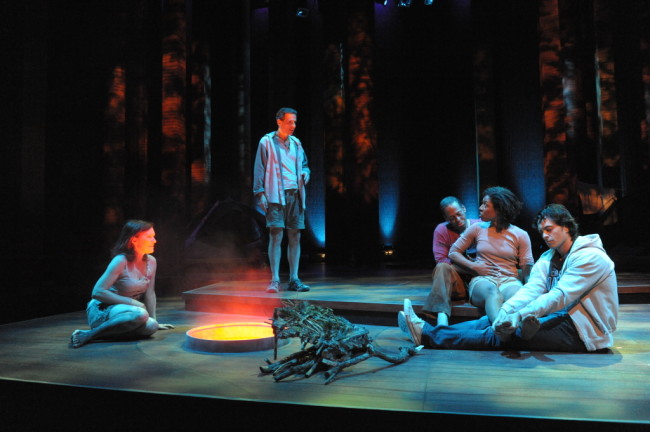 But
where “Detroit” blew up with a force you couldn’t ignore, the
mysterious “Cherokee” is an understated invitation you can take or
leave. The conundrum that D’Amour cooks up is tantalizing, and it’s
staged with woodsy serenity at Woolly by “Detroit” director John
Vreeke. But the coolly written play is so coy that key details seem to
evaporate before you can take them in. But
where “Detroit” blew up with a force you couldn’t ignore, the
mysterious “Cherokee” is an understated invitation you can take or
leave. The conundrum that D’Amour cooks up is tantalizing, and it’s
staged with woodsy serenity at Woolly by “Detroit” director John
Vreeke. But the coolly written play is so coy that key details seem to
evaporate before you can take them in.
Then again, disappearance is what it’s all about. The Houston foursome
is white couple John (Paul Morella) and Janine (Jennifer Mendenhall),
and black couple Mike (Thomas W. Jones II) and Traci (Erica Chamblee).
John is a tightly wound oil exec. Mike is his longtime buddy. John and
Janine have children; the children stayed home. Mike and Traci are
trying to conceive; amusingly, we hear them at it in the tent.
And then Mike, the
one most unnerved by every chirp and
snapped twig in the woods, vanishes. The search is on, kind of, and if
you want to nitpick with the script, the group’s lack of urgency over
this missing person is one place you could start. Helping, sort of, is
Josh (Jason Grasl), a member of the Cherokee tribe that runs the big
local casino and that offers outdoor performances of a historical
drama. (“Unto These Hills” is the show staged during the warm months in
the real Cherokee, N.C., where there’s also a Harrah’s casino.)
The
easygoing production attractively seduces you toward a wilderness
state of mind. Daniel Ettinger’s set features stylized woods that soar
to the highest reaches of Woolly’s ample stage, with shadowy nighttime
lighting by Colin K. Bills and outdoorsy sound from Palmer Hefferan.
The acting in this environment is appropriately wide-eyed and mystical
as nature infects these suburbanites with such rapture that they
seriously talk about never going back.
Morella
and Mendenhall nicely capture the intoxication of a
chuck-it-all freedom (an idea that was chug-a-lugged in “Detroit”) as
John and Janine reconnect with what they think are their purer selves.
The other characters are more complicated, and the performances are
necessarily slippery. Chamblee remains a kindly blank slate as Traci,
who isn’t as traumatized by the calamity of Mike’s disappearance as we
might expect. Jones’s normal-guy Mike and Grasl’s sage Josh are also
deliberately blurry, though for different reasons — and it would spoil
the twists in the plot to say why.

It
isn’t giving away too much to reveal the hot-button issue pushed by
D’Amour’s first act cliffhanger. It’s identity, with these varied
characters wrestling with all kinds of history — personal, cultural,
national. Setting the play in a place like Cherokee, a tourist trap
built on the 19th-century Trail of Tears, coaxes you to try to connect
these dots, especially as “code switching,” or toggling between
linguistic styles, steps forward as a theme.
“Reality
is not a fixed state,” one character insists as the
increasingly peculiar group argues whether they can live together in
this potential utopia, and as they bicker about who has been true or
false to whom.
Substantial
as the themes are, they’re generating an oddly light puzzle
of a play. D’Amour was better known as an experimentalist before
“Detroit” brought her mainstream acclaim, and “Cherokee” is in a
quirkier key. The drama murmurs provocative questions but spins away
from clear answers in its nowhere world.
The
Woolly production features what looks like live action projections
of the characters in the mountains and in the food halls, and their
bodies slowly fade and dissolve on the screen. At first the video seems
like a distraction, but it turns out to be awfully close to the heart
of the play. There’s a revolution going on; it’s just low-key and
naggingly enigmatic — like the faces on the screen, a little too easily
wiped away.
Review By Nelson
Pressley, Washington Post, 2/16/15
|

"For anyone willing to make the investment,
Cherokee is guaranteed to
give back tenfold or more. Unpack your assumptions and see this show"
Review
by Betsy Marks Delaney, Theatre Bloom, 2/15/15
We
sometimes think we visit our souls when we enter a museum, take a
stroll on a beach, or walk through a forest. We search for a key to
connecting with our roots or with reality when we take that drive-by
study of unfamiliar culture or lifestyle. Woolly Mammoth Theatre
Company‘s new world premiere work, Cherokee by Obie Award-Winning
playwright Lisa D’Amour, directed by John Vreeke, seeks to expose the
subtext beneath those superficial whims that drive us to seek that
connection.
From
the official description of the play: “Two couples—one black, one
white—flee their suburban pressures and try to connect with nature by
going camping in Cherokee, North Carolina. But their vacation is
upended when one member of the group mysteriously vanishes and the
others are visited by a Native American local…who unearths buried
desires that might change their lives forever. Cherokee is about a
disparate group of Americans grappling with vital questions: What does
it mean to lead an authentic life? What are we willing to give up to
have our lives transformed?”
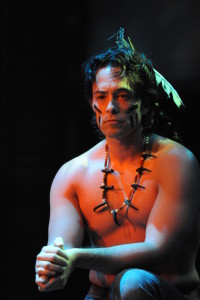 Cherokee
begins without ceremony or warning, house lights still lit. This
meta-theatre entrance to a wickedly astute study of expectations and
the unknown core plunges us into the dark, and then into the world of
John (Paul Morella), bored oil industry businessman, his 3rd grade
teacher wife Janine (Jennifer Mendenhall), whose manic enthusiasm is
peculiarly reserved for mentors of the very young, Mike (Thomas W.
Jones), so terribly out of place in the forest you think he might just
explode when the next gnat lands on him, and his young, enthusiastic
wife Traci (Erica Chamblee) so focused on becoming the mother of Mike’s
child, she nearly loses herself. Cherokee
begins without ceremony or warning, house lights still lit. This
meta-theatre entrance to a wickedly astute study of expectations and
the unknown core plunges us into the dark, and then into the world of
John (Paul Morella), bored oil industry businessman, his 3rd grade
teacher wife Janine (Jennifer Mendenhall), whose manic enthusiasm is
peculiarly reserved for mentors of the very young, Mike (Thomas W.
Jones), so terribly out of place in the forest you think he might just
explode when the next gnat lands on him, and his young, enthusiastic
wife Traci (Erica Chamblee) so focused on becoming the mother of Mike’s
child, she nearly loses herself.
And
then there’s us: The audience, voyeurs on this quartet’s journey
to reconnect with the primeval forces of nature. We are essential to
the story, because this is as much an exploration of our own
expectations as it is a journey for the characters on stage.
At
the core of every piece of drama is the caricature – the
nugget of truth as the actors see it – and how we as audience are
expected to relate to and interpret that truth. Vreeke takes our hands,
coaxing us into this world with initial wonder and enthusiasm, until we
find ourselves down in that rabbit hole with the characters, where our
own preconceived notions lead us to believe we understand the roles
being played, until it becomes clear we have no idea what’s next.
As
audience members we acknowledge the actors and recognize their
roles. We relate to the stereotypes at some level of expectation,
because we are told that this is who these people are. In many ways we
all operate in the same space as these characters. We all portray at
any given time the roles of teacher, wife, father, daughter, student,
friend, lover, spirit guide, employee, boss. Those are expectations.
Preconceived notions we show to the world when we operate within its
rules, so that we can survive for another day doing what we think we
need to do to survive.
But
what does it take to survive in an increasingly complex world that
so often robs us of our self in every sense? Into this maelstrom of
“normal” we come to know Josh (Jason Grasl) a mystical figure who finds
his way to the campsite in the Great Smoky Mountains outside Cherokee,
NC, not far from Harrah’s Cherokee Casino. Josh’s appearance is the
catalyst for a journey that carries these characters far, far outside
their comfort zones of high end camping gear and expensive designer
shoes and into the forest of emotions as they try to make sense of
their world and discover themselves increasingly untethered and adrift.
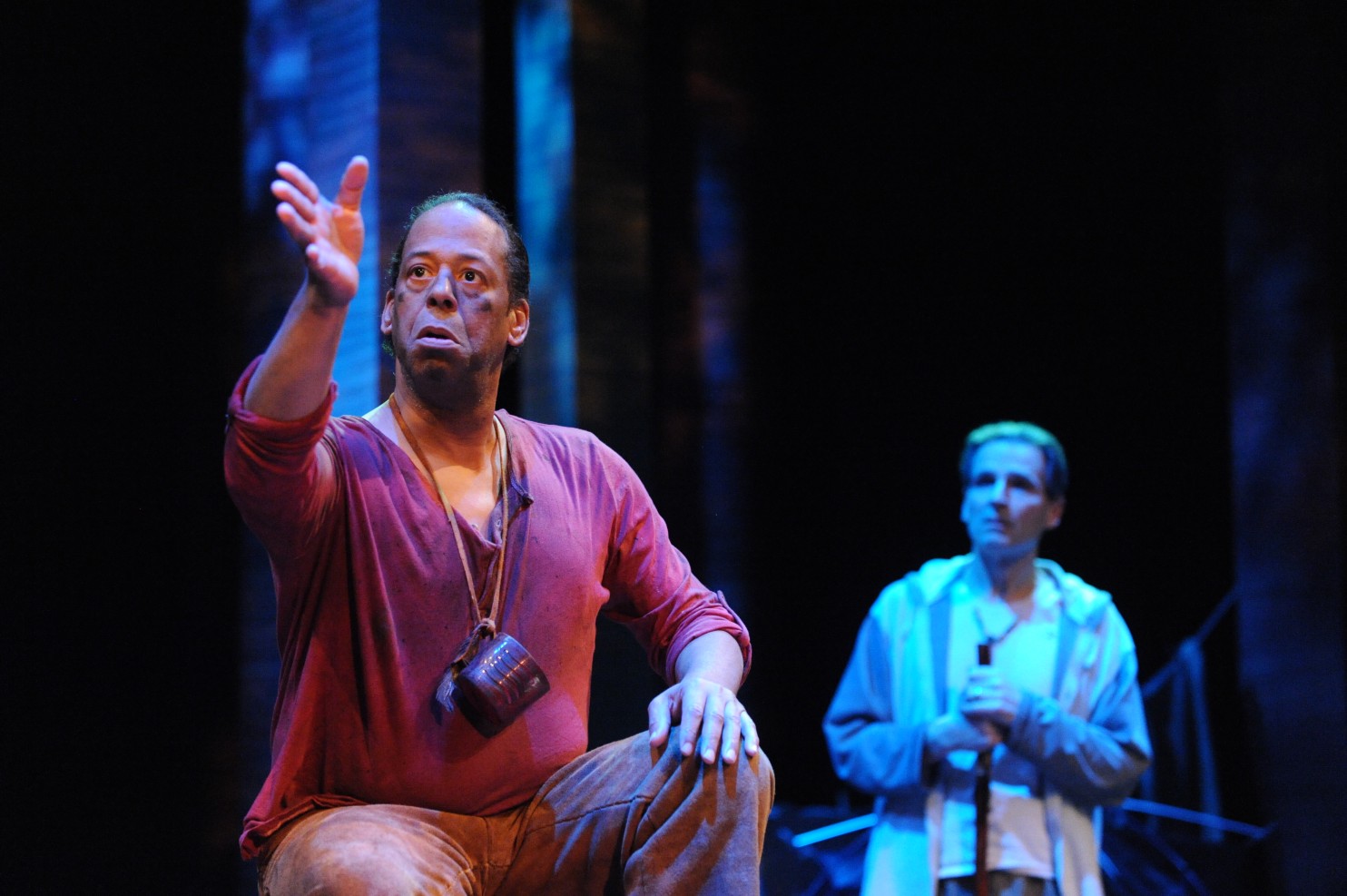 Daniel Ettinger’s deceptively simple fluid forest of wooden pillars and
moving platforms combine with Colin K. Bills’ nimble lighting design to
frame the space with shafts of leaf-filtered sunlight or moonlight
interspersed with the artificial entertainment environment of locations
within the casino and elsewhere in Cherokee, give us context. Aaron
Fisher’s projections – a nod to ever-present documentary videos that
bring us all closer to the Museum Experience – place the characters
into the documentary in an almost-overdone conceit that reminds us each
time how intrusive technology can become.
Daniel Ettinger’s deceptively simple fluid forest of wooden pillars and
moving platforms combine with Colin K. Bills’ nimble lighting design to
frame the space with shafts of leaf-filtered sunlight or moonlight
interspersed with the artificial entertainment environment of locations
within the casino and elsewhere in Cherokee, give us context. Aaron
Fisher’s projections – a nod to ever-present documentary videos that
bring us all closer to the Museum Experience – place the characters
into the documentary in an almost-overdone conceit that reminds us each
time how intrusive technology can become.
Even
the lobby has that museum riff going, with a short Facebook
app-driven quiz that brings YOU closer to the true camping experience.
(I scored “Day Tripper” in my version of the quiz – A fair cop if ever
there was one for my method of travel into camping and forest
exploration.) It is this extra step, for the willing participant, which
helps launch the audience member into the role of willing observer and
witness.
If
ever a work managed to strip away preconceived notions of self,
this is it. In her preface to the play, “Old Mountains”, Tiya Miles
says “Cherokee subtly plays with notions of primal knowledge, cultural
expectation, trickster figures, and racial stereotypes and suggests
that bonds of affinity can be forged across these lines of difference.”
No
matter where the five characters begin in this story, they all end
somewhere radically different. It’s not so much magic as there is a
rending, like the release of a knotted muscle under the skin that
allows you to relax and then overextend just as our assumptions about
reality and our place in it are torn away, stripped bare and exposed,
underneath clear skies, burning embers and the enhanced beat of drums
that take advantage of our senses in ways we only think we know. Five
minutes into the second half of the play, we find that everything we
know is wrong, and that everything simply…is.
For
anyone willing to make the investment, Cherokee is guaranteed
to give back tenfold or more. Unpack your assumptions and see this show
Review by Betsy
Marks Delaney, Theatre Bloom, 2/15/15
|
"Director John Vreeke has taken a script
that has fascinating potential
and nourished the surreal aspect of this mind-expanding getaway"
Review by Brian
Bochicchio, MD Theatre Guide, 2/17/15
What is it about this verging-on-stereotype artistic inspiration that
by placing most of our belongings in an SUV and visiting that thing
called nature we will plumb new depths, understand our inner selves?
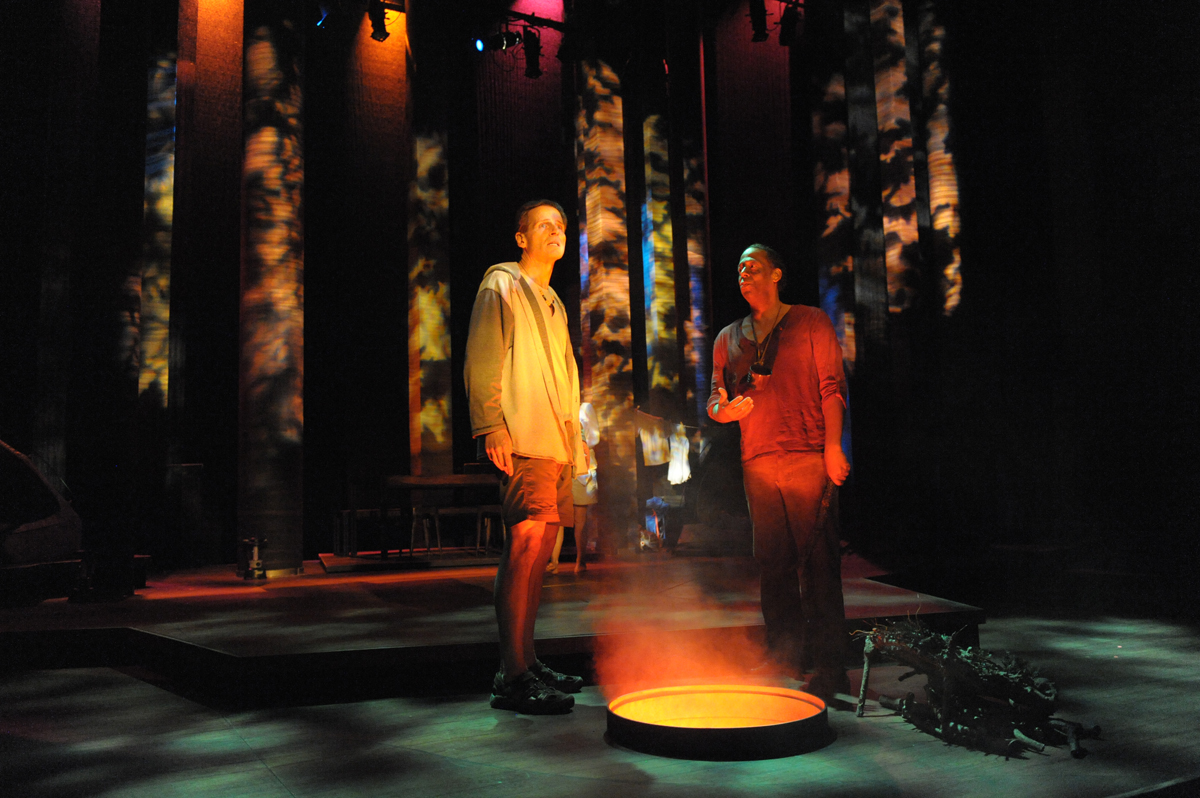 We
again pack our propane and bug spray, but with some decidedly new
twists, in Woolly Mammoth’s lead production of 2015, playwright Lisa
D’Amour’s Cherokee. We
again pack our propane and bug spray, but with some decidedly new
twists, in Woolly Mammoth’s lead production of 2015, playwright Lisa
D’Amour’s Cherokee.
D’Amour, an Obie award winner, has had her work performed nationally,
and was seen here at Woolly Mammoth in 2014 in her work Detroit,
featuring a set of couples dealing with suburbia. She has
exhibited a
talent for exploring and exploding common situations, and this time
places her characters far more outside of their element.
That setting is the Nantahala National Forest in Western North
Carolina, a land of rugged vistas, wild rivers and a nearby Cherokee
reservation. Reviewer’s intermission: I visited this area just last
summer and it is a great getaway in addition to being close enough to
civilization to be kinda camping.
Introduced by the eerie wailing chants from a series of native American
songs, we meet 2 married couples; John and Janine (Paul Morella and
Jennifer Mendenhall) and their friends Mike and Traci (Thomas W. Jones
Jr. and Erica Chamblee). They amble onto a forest-like set nicely
backlit as if a surrounded by a tree canopy, courtesy of set designer
Daniel Ettinger and rest of the production staff.
Talking about kids and old times and taking mountain selfies (kitschy
but cool with an interactive screen mirroring the action) they are the
quintessential peeps on vacation. An underlying current of discontent
emerges as John, Janine explains, just needs to get away from the
stress, and he unexpectedly intones ‘I want something bad to happen.’
Into the mix is Josh, (Jason Grasl) a local Indian youth working at the
casino who happens to drop by. Grasl is not who he appears and stays
appropriately mysterious; his presence is intended to bring
enlightenment, embodying the Indian Trickster role.
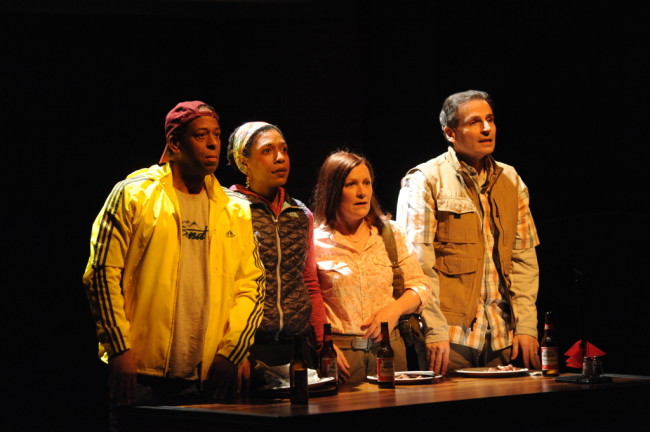 Their
nature excursion takes a seismic shift as Mike walks off from the
campsite and disappears. This starts a chain of events that are tough
to wrap your head around—John and Janine decide to stay in the woods
indefinitely, and ask the others to join them. Josh and Traci form a
bond, and then the big elephant–the emergence of Mike again, under
another identity. Without the work of this gifted cast, this would be a
cobbled together question mark. Their
nature excursion takes a seismic shift as Mike walks off from the
campsite and disappears. This starts a chain of events that are tough
to wrap your head around—John and Janine decide to stay in the woods
indefinitely, and ask the others to join them. Josh and Traci form a
bond, and then the big elephant–the emergence of Mike again, under
another identity. Without the work of this gifted cast, this would be a
cobbled together question mark.
Director John Vreeke has taken a script that has
fascinating
potential and nourished the surreal aspect of this mind-expanding
getaway. Local fixture Morella as the earnest everyman is solid and
exudes visual pain in trying to figure out all that is happening.
Stage wife Mendenhall plays to her supportive nurturing part and breaks
out wonderfully as a bloody good hunter later in the show. Chamblee and
Jones have good newlywed awkwardness and in his transformation, Jones
was a revelation as a freed soul in a new life.
Woolly Mammoth has provided us with a fascinating suburban offramp–an
immersion into the great outdoors without being hokey about it. There
is some suspension of belief involved as our conventions are exploded
in Cherokee. And just like a random walk in the woods, each scene comes
upon us as a separate vignette. Billed as a comedy, it is much more a
situational drama that rises to another level courtesy of fine stage
work. Take a woolly walk in the woods. But bring your flashlight. You
may have to find your way back.
Review by Brian
Bochicchio, MD Theatre Guide, 2/17/15
|
|
|